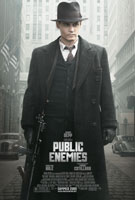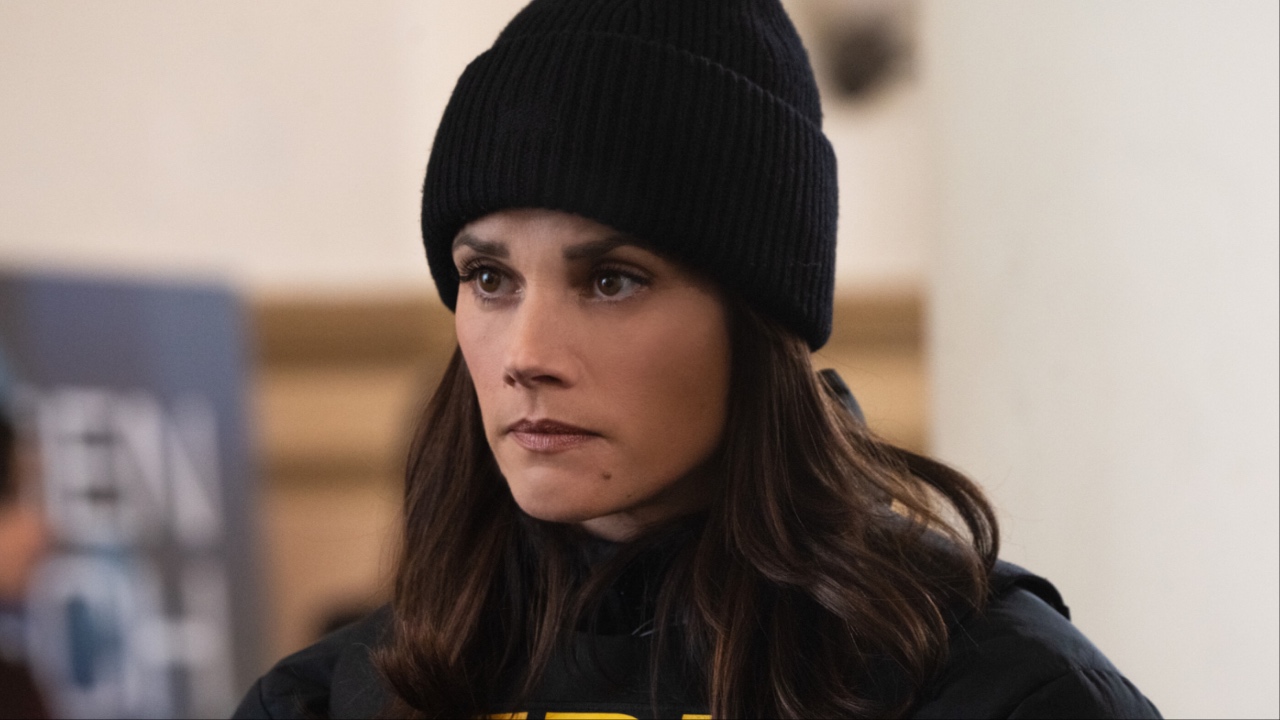There are a million interesting things about 1930s gangster folk hero John Dillinger, from his expert manipulation of the press to his trick of robbing banks and letting the customers keep their money. But somehow Michael Mann, who has made an entire movie about Dillinger, Public Enemies, seems interested in none of it. Letting the story plod by almost glumly, in the script he co-wrote with Ronan Bennett, Mann saves all his directorial zeal for the visual style, using high-def digital cinematography to lend the feel an urgent, crisply modern feel. The result is a film that sings in the visually dynamic sequences-- the shoot-outs, the bank robberies, any scene with Marion Cotillard-- but feels excruciatingly slow as soon as someone opens their mouth. Public Enemies is a series of theses, not a story, and nothing in Mann's bag of tricks makes it cohere.
At least it opens with a bang, at an Indiana prison where Dillinger helped break out some compatriots, but lost some lives along the way. Covering a fairly brief period of Dillinger's life, starting with the Indiana prison break and ending with his inevitable demise outside a Chicago movie theater. He's surrounded by a revolving door of compatriots, who barely get names or personalities, and has a vague relationship with a large crime syndicate, but for the most part Dillinger is a man against the world. The film's only narrative tension comes from a sense of doom, as Dillinger's associates are killed off, as the newly formed FBI closes in on him, and even the rest of the crime world turns their back on the singularly violent and charismatic gangster.
The string of robberies and shoot-outs are broken up occasionally by Dillinger's relationship with coat check girl Billie Frechette (Marion Cotillard), not so much an accomplice in his crime sprees but an emotional anchor for him to come home to. Dillinger woos her with a version of what's essentially the "ranch across the border" speech every cowboy gave his gal, and it's clear that, underneath the grandstanding for the press and his way with a gun, Dillinger harbors a vision of himself as the kind of strong man a woman can rely on. Cotillard and Depp are both wonderful to watch together, and Cotillard especially shines in later scenes when the Feds have her captured. But before too long it's back off to war for Dillinger, back to murky shootout scenes and tommy guns, and back to a movie that doesn't seem to know where it's going or why.
I've gotten this far without mentioning Christian Bale, ostensibly the second lead as dedicated G-Man Melvin Purvis, and just as boring here as he was as John Connor a few months back. He and Depp really only have one scene together, when Dillinger is imprisoned in a seemingly locksafe cell, and Bale holds himself just fine. But as this once-promising actor seems to descend further and further into lockjaw stoicism and a stiff sense of how a leading man behaves. Bale should consider himself lucky he shared so little time with an easily charismatic presence like Depp. Billy Crudup is the other main lawman figure here, and while his super-serious J. Edgar Hoover works, his affected 1930s accent makes him sound more like a newsreel announcer than a person, completely out of step with the rest of the film's modern feel.
Though the first hour features a few stellar individual scenes, including that first jailbreak and an incredibly brief sequence that both introduces and kills off gangster Pretty Boy Floyd (Channing Tatum), the story itself takes forever to get going. Mann fanatics and other purists will probably argue this is the goal of the art film, but the narrative just feels genuinely unfocused, chasing after various elements of Dillinger's biography and the FBI's origins without making any effort to tie them together. The film picks up substantially in its second half, as we spent less time with Purvis and his team and the noose grows tighter around Dillinger's neck. You can almost feel the movie start to lift following another elegant jaiibreak sequence, when Dillinger drives the getaway car and cheekily sings "Get Along, Little Dogies." The meaning of that moment becomes crystal clear later, when the hostage Dillinger is driving sings the song for the benefit of the awestruck press. Even in this seemingly unwatched moment, Dillinger was crafting his image and taking charge of it, giving the public one more folk tale to hang on to.
There are many sly moments like that throughout Public Enemies, and they leave no doubt that this is a very deliberate, very minutely crafted film, one that both Mann and Depp are in complete control of. Even that pesky cinematography, which looks gorgeous in the small scenes and impossibly insufficient in the big ones, is all part of a plan to make Public Enemies unlike whatever you expected from a gangster film. I'm just not convinced that Mann's experiments are worth it, that the choice to style up an uninspiring narrative yields anything than a gussied-up slog through history.
Staff Writer at CinemaBlend












